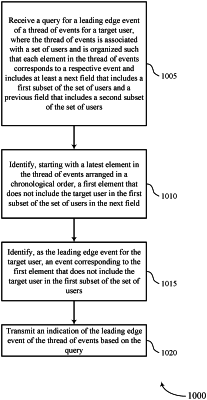| CPC G06F 9/4881 (2013.01) [G06F 9/542 (2013.01)] | 20 Claims |

|
1. A method for data processing, comprising:
receiving a query for a leading edge event of a thread of events associated with a plurality of user identifiers, the query indicating a target user identifier of the plurality of user identifiers that are participants to the thread of events, wherein each element of the thread of events corresponds to a communication between two or more user identifiers of the plurality of user identifiers, and wherein one or more of the elements include a respective next field that indicates a respective subset of user identifiers from the plurality of user identifiers;
traversing respective elements of respective events of the thread of events, starting with a latest element in the thread of events arranged in a chronological order until identification of a first element that does not include the target user identifier in the respective next field of the first element;
identifying, as the leading edge event for the target user identifier, an event corresponding to the first element that does not include the target user identifier in the respective next field; and
transmitting an indication of the leading edge event of the thread of events based at least in part on the query.
|